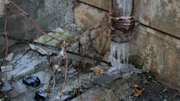Decluttering tips for a safer, less-stressful home
Frozen pipes: don’t get in a fix

The last thing anyone wants this winter is for pipes to freeze, burst and flood their homes. But with colder weather on the horizon, it’s a growing risk for households across the UK.
The good news is that there are lots of steps you can take to keep your pipes intact and your home dry. Even if the worst happens, there are things you can do to minimise the damage. Let’s take a look at the options.
Wrap up for winter
The Association of British Insurers says that its members pay out £1.8 million every day for ‘escape of water’ claims.
Freezing water expands as it turns into ice and can split pipes in the process. So, it’s worth doing some checks before the cold weather arrives.
Many water tanks and pipes are situated in lofts where there’s no central heating. Pipe lagging and insulation helps to stop the water inside from freezing, so it makes sense to ensure pipes and tanks are properly wrapped up.
Keep an eye on outdoor pipes
Don’t forget about insulating external pipes and taps. You might also consider turning off the water supply to outdoor taps if they’re not being used over the winter.
If you decide to do this, remember there may be water left resting in the plumbing. To prevent this splitting a pipe if it freezes, leave the tap turned on once it has been isolated, so the water has room to expand if it turns to ice.
If you’re going to be away from home, keep the heating on low during the coldest part of the day and night to stop pipes freezing.
Be ready for anything
Sometimes even good planning won’t prevent a mishap. If your pipes do burst, then minimising the damage is the priority.
Cutting off the flow of water is the best way to do this. The stopcock will let you isolate your property from the mains supply, so make sure you know where it’s located.
If you’re going to be away, it’s worth asking someone to check in on your property and telling them where the stopcock is, just in case they need it.
If you uncover a leak, you might also need to turn off the electricity, so it’s a good idea to locate your fuse box beforehand.
Automated leak protection
You could think about installing a leak detection system too, which monitors the flow of water in your house and can turn off the supply if it suspects there is a leak.
Hopefully you’ll never have to deal with a burst pipe, but it’s always a good idea to be prepared.
To learn more about how we can help protect your home from unwanted leaks and other potential problems, visit our home insurance page.
Exclusive offers for Co-op Members

Home insurance
Exclusive member price on home insurance.
Your discount is not available on add ons and is applied if your details match those on our membership database.

Renters insurance
Co-op Members who take out renters insurance will get a 5% discount.
Member discount applied if matched during quote process.






